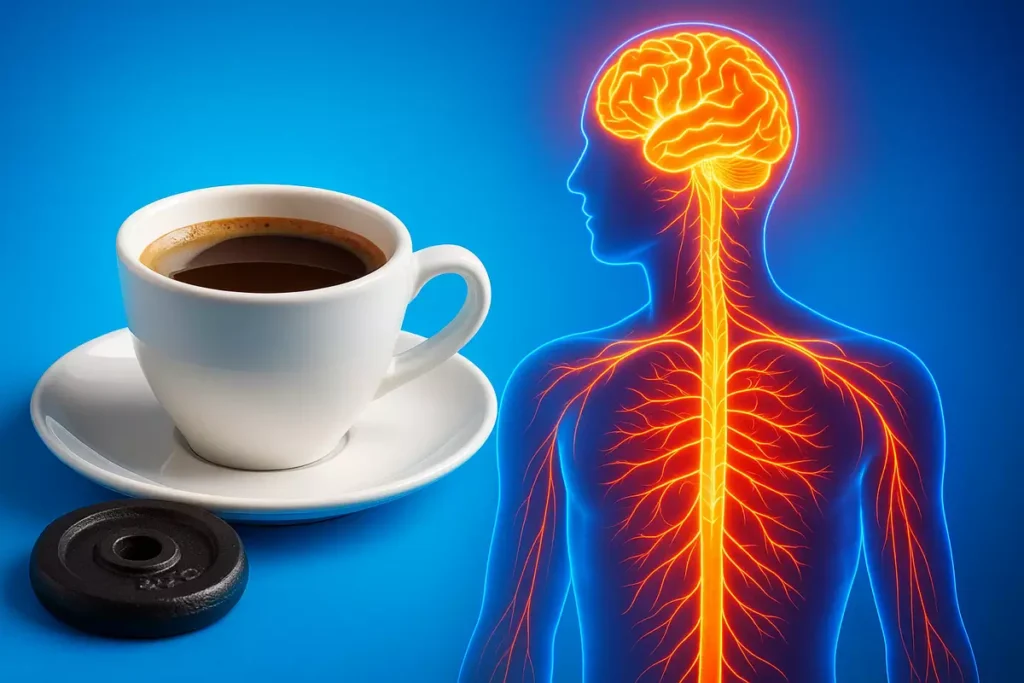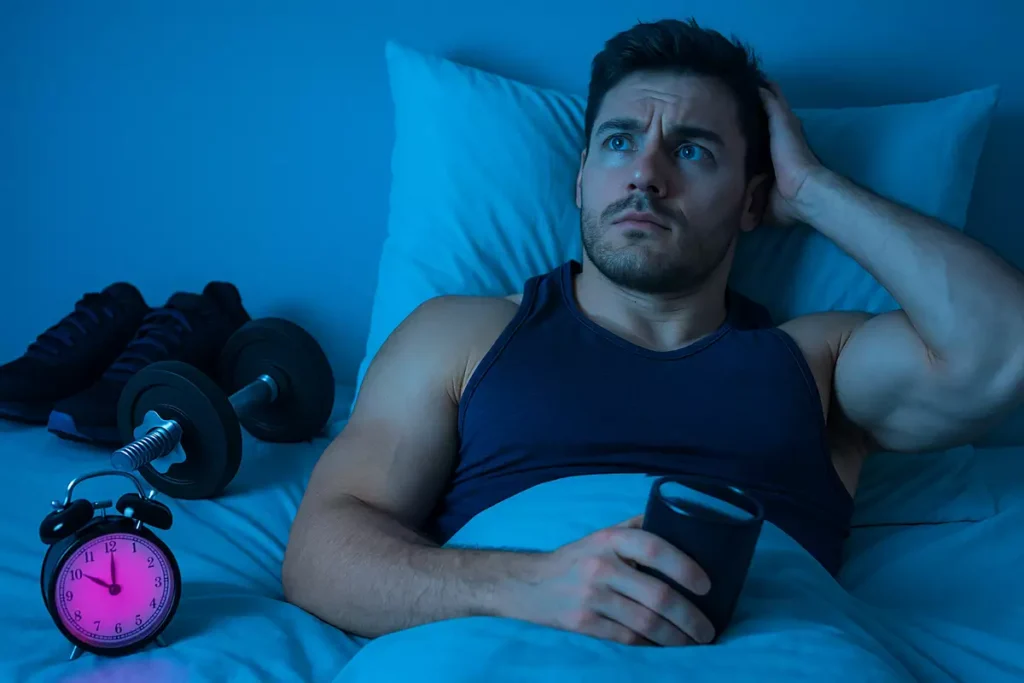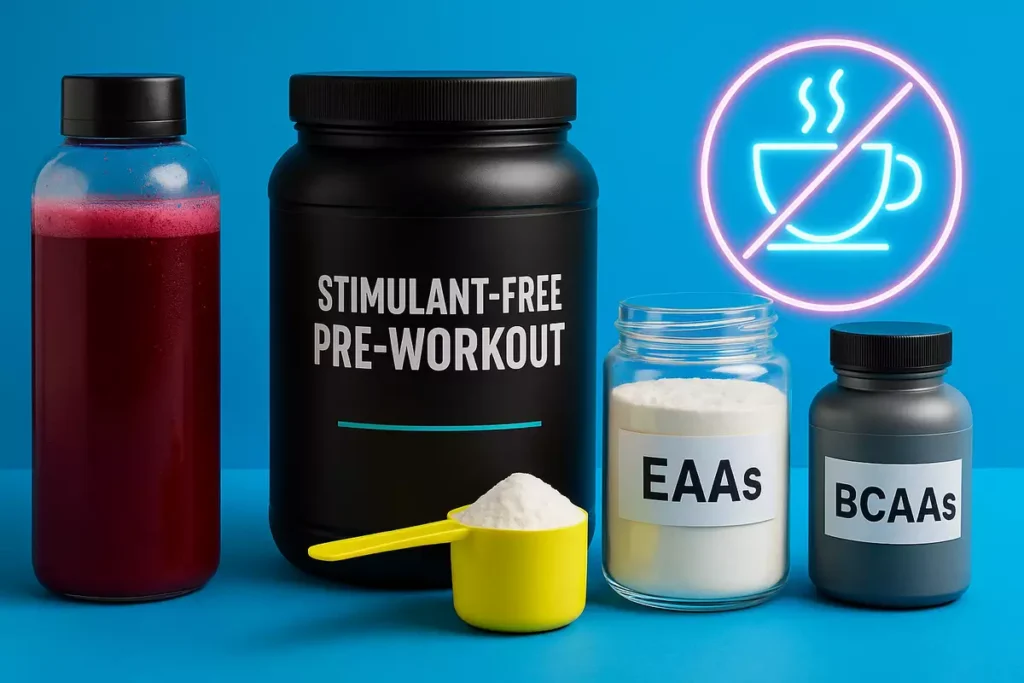Late-night workouts can feel amazing—you’re pushing hard, adrenaline is high, and caffeine gives you that extra boost to crush your session.
But here’s the catch: that same caffeine might be the reason you’re tossing and turning hours after your workout.
Many lifters, including myself and my clients, have experienced wired nights, shallow sleep, and slower recovery after evening caffeine use.
In this guide, you’ll discover exactly how caffeine affects your sleep after late workouts, why timing matters, and proven strategies to boost performance without sacrificing rest.
Table of contents
- Quick Answer
- How Caffeine Impacts the Nervous System
- Timing Matters – Evening vs. Morning Workouts
- Effects on Sleep Quality and Recovery
- How Long Caffeine Stays in Your System
- Smart Pre-Workout Alternatives for Late Training
- Practical Tips to Avoid Sleep Disruption
- Conclusion – Balancing Performance and Rest
Quick Answer
Late-night workouts can feel amazing—you’re pushing hard, adrenaline is high, and caffeine gives you that extra boost to crush your session.
But here’s the catch: that same caffeine might be the reason you’re tossing and turning hours after your workout.
Many lifters, including myself and my clients, have experienced wired nights, shallow sleep, and slower recovery after evening caffeine use.
In this guide, you’ll discover exactly how caffeine affects your sleep after late workouts, why timing matters, and proven strategies to boost performance without sacrificing rest.
How Caffeine Impacts the Nervous System

Caffeine works by blocking adenosine, a brain chemical that makes you feel sleepy.
It also stimulates the central nervous system, boosting alertness, reaction time, and workout intensity. This is why most athletes rely on caffeine.
However, the same stimulant that powers you through a workout can also leave your mind buzzing long after you hit the pillow.
I’ll never forget a session with Lucas, a client from Spain. He decided to “go big” on his pre-workout stack—400 mg of caffeine—before our 6:30 PM chest session.
He crushed his lifts and hit new PRs, but later that night, he texted me: “Coach, it’s 3 AM, and I’m still too wired to sleep!” This is a textbook example of caffeine overstimulating the nervous system.
Timing Matters – Evening vs. Morning Workouts
Timing is crucial. Morning caffeine use rarely causes problems because the body has hours to metabolize it.
Evening workouts, though, are a different story. From my own experience, consuming caffeine after 5 PM almost always pushes my bedtime back by at least 1–2 hours.
Even when I cut my usual dose in half, I still struggled to fall asleep.
One of my female clients, Emily from Canada, used to take her regular pre-workout drink before 8 PM HIIT classes. She complained of lying awake until 1 AM.
When we switched her pre-workout to a low-stim caffeine alternative, she started sleeping normally within a week.
Effects on Sleep Quality and Recovery

Poor sleep isn’t just about feeling tired—it directly affects muscle recovery, hormonal balance, and fat loss.
When I tested caffeine for late-night training over three weeks, my sleep tracker showed I was getting 30% less deep sleep.
My morning energy dropped, my lifts felt heavier, and muscle soreness lasted longer.
One of my long-term clients, Markus from Germany, had a similar experience. He used 250 mg caffeine at 7 PM almost every training day.
Over time, he noticed slower recovery and mild irritability. After cutting caffeine from evening sessions, his sleep improved, and he regained strength faster.
I’ve also seen caffeine affect hormonal balance in evening trainers, adding another layer to recovery issues.
How Long Caffeine Stays in Your System
Caffeine has a half-life of about 5–6 hours.
This means that if you take 200 mg at 6 PM, around 100 mg is still active at midnight, keeping your brain alert and preventing deep sleep cycles.
I remember using a high-caffeine pre-workout for evening training and thinking, “It’s been hours—I should be fine.”
But my smartwatch showed my heart rate was elevated even while lying in bed. The science explains why: caffeine was still active in my system.
Smart Pre-Workout Alternatives for Late Training

Through coaching and personal trials, here’s what worked best for evening training sessions:
- Low-stimulant pre-workouts (50–80 mg caffeine).
- Stimulant-free formulas with beta-alanine and creatine, often stacked with non-caffeine boosters.
- Natural energy aids, like beetroot juice or peppermint oil inhalation.
For example, Sofia from Brazil swapped her high-caffeine pre-workout for an EAA supplement.
Within a few days, she reported having the same energy during training but finally being able to sleep peacefully.
You can also check out these clean caffeine sources if you want a smoother, less disruptive energy boost.
Practical Tips to Avoid Sleep Disruption
- Stop caffeine at least 6 hours before bedtime.
- Cut the dose in half if evening training is unavoidable.
- Use stimulant-free pre-workouts or BCAAs instead.
- Create a wind-down routine—stretching, deep breathing, a warm shower, or magnesium tea can help lower stimulation.
I personally had to change my routine to train without heavy stimulants in the evenings.
After doing so, I noticed better recovery, higher energy the next morning, and more consistent progress.
Conclusion – Balancing Performance and Rest
Caffeine is an excellent tool for boosting workout performance, but it comes with a cost if used too late.
By adjusting your timing, reducing doses, and choosing stimulant-free alternatives, you can enjoy strong workouts and still get restorative sleep.
I’ve been through the frustration of late-night sleeplessness caused by caffeine.
Once I learned to manage it, my sleep, recovery, and muscle gains improved dramatically.
You can do the same—and trust me, your future self will thank you for balancing both performance and rest.



Leave a Reply